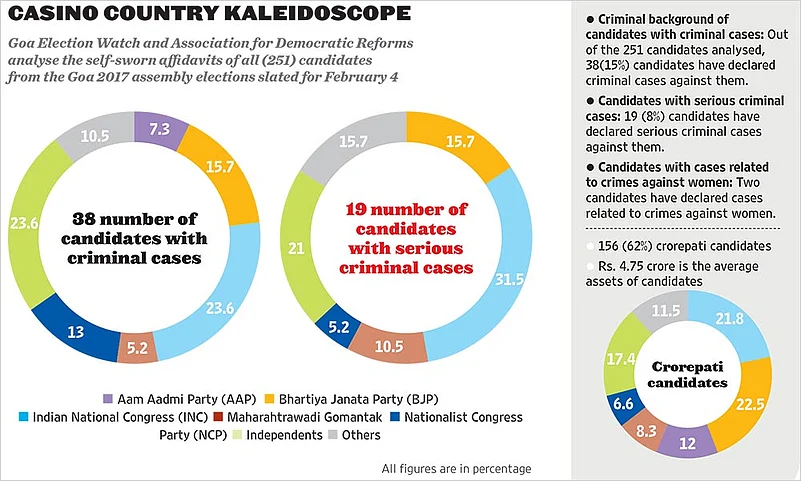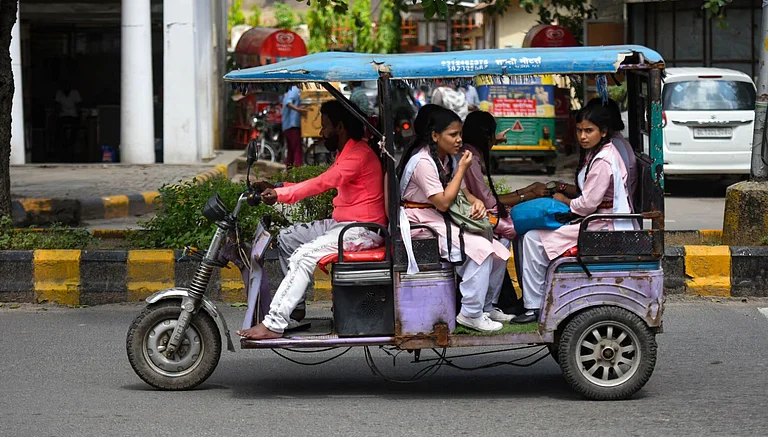Just as a wave hits the shore and retreats, a strong roll of advancing water bounces over it. The noisy overlap is symbolic of two Goan leaders who, till recently, belonged to the same political camp. Their friction divided the ruling BJP in the tiny coastal state: a breakaway faction led by former RSS chief Subhash Velingkar is a party since last October. His Goa Suraksha Manch is now with the Shiv Sena and the Maharashtrawadi Gomantak Party ahead of the February 4 assembly election. This has worked against Velingkar’s protégé Manohar Parrikar, the defence minister with the NDA government. The two often spar.
A scholastic issue triggered it. Dispute over primary education in local language led to Velingkar’s revolt. “Parrikar has cheated Goans. He also misled the RSS when this matter came up. The split was over principles,” says Velingkar, 68, seven years older than Parrikar, who was the state’s chief minister for 32 months from March 2012. “We are sure of winning more votes than the BJP. There is absolutely no chance of a (post-poll) tie-up.”
Velingkar, perhaps after suffering the challenge of being relieved by the RSS (in September last year) after 55 years of association with the Sangh, is prepared for any eventuality. “If things don’t work our way, it’s better we walk alone.”
Parrikar faces flak for spending more time in Goa than in Delhi and controlling the BJP’s affairs in his native state with 11 lakh voters. He is unruffled. “I will do whatever the party wants me to.” Then, he asks, cryptically: “Is there any complaint of file delays in the defence ministry?” As for the Sangh support, the minister says he enjoys the confidence of “the real RSS of Nagpur”, not of Velingkar (who held no post in the BJP anyway).
While the feud goes on, it isn’t that the opposition Congress is able to capitalise on the split in BJP-RSS-Sena factions. Fraught with infighting, the Grand Old Party that won only nine out of the 40 seats in 2012 is most recently in a hot dispute over whether to forge alliances with smaller parties. In fact, two of its MLAs joined the BJP, but the Congress has put up a brave show, claiming the voters will give the party a majority.

“On battleground, we go united,” claims senior Congress functionary Luizinho Faleiro, two days after party national vice-president Rahul Gandhi addressed a rally in Panjim. His colleague Digambar Kamat, an ex-CM, highlights a pending district hospital project in Madgaon. The party continues to find itself on the back foot when it comes to a core environmental issue such as mining. Its leaders predominantly hope for anti-incumbency—if at all.
The Aam Aadmi Party is a new story here. The nascent outfit has no baggage or skeletons of the past, yet most people are not expecting the AAP to trigger a political landslide even as they are appreciative of its efforts against corruption. While a few hoardings over a 60-km stretch from Panaji to south Goa talk about the BJP’s failed promises and U-turns of Parrikar, images of current CM Laxmikant Parsekar are almost unseen in the state that has seen electioneering by Prime Minister Narendra Modi, his party president Amit Shah, Shiv Sena chief Uddhav Thackeray, Delhi CM Arvind Kejriwal, his Maharashtra counterpart Devendra Fadnavis and NCP supremo Sharad Pawar, besides Rahul.
Notwithstanding the placidity of its beaches and hills, Goa has residents largely disappointed with all political parties. “People needed a different option in 2012 because of rampant corruption in the Congress government,” recalls Prasad, a fitness trainer, not wanting to divulge his second name. “The BJP could have done much better. They just brought up issues like grants for primary English education and closure of casinos, but didn’t do anything. These weren’t the most important issues for the common man.”
Activists working for youth and for the state’s fragile environment ravaged by illegal mining for years say political parties have not made sustainable mining an honest agenda. Estimates vary about the number of people rendered jobless or the loss to exchequer because of non-payment of royalty or undervaluing of extracts, but activists hope for a solution. “We need to adopt a system like Norway where a permanent fund is created and the government is able to get enough revenue,” says urban planner Dean D’Cruz who works for the AAP, though he is not a member of the party. “For, the ore does not belong to the lease owners; it belongs to the people of Goa.”
AAP is the only party to have declared its chief ministerial candidate: Elvis Gomes. A former IG (Prisons), he has worked in the system long enough to know what ails the bureaucracy. “The AAP started serious preparations four months before anyone else did,” he points out, readying for his door-to-door campaigning at 8.30 a.m. “We were the first to declare our candidates and to bring out party manifesto. We have given representation to five women and four ST candidates.”
Gomes takes a dig at Modi’s recent assurance of making Goa “more comfortable”. “The state needs delivery systems with clear vision. This time there is an alternative,” he says about the AAP, which has promised to monitor mining and to close casinos.
The state’s gambling houses seem to have become an election issue with every party promising to shut them, but none actually doing it. “It has become a social problem because all parties are getting funds from them and the youth are losing all their income at the casinos,” says an old citizen. “It has also become a starting point for crimes related to drugs and prostitution.”
What bothers activists is increased percentage of candidates with criminal backgrounds. “One worries if this is the start of criminalisation of politics in Goa,” says Bhasker Assoldekar, the state coordinator of the Association of Democratic Reforms, a 1999-founded national NGO that works for electoral reforms.
Youngsters, largely, refuse to attend poll rallies. “They somehow expect us to simply do some business around tourism. Job is the real issue,” says a local youth. Chimes in his friend: “The Congress was corrupt, but they gave jobs to Scheduled Caste people. This government has not done even that.”
Amid jokes about the candidates and manifestos, the commoners and experts predict a hung assembly, with the BJP taking the lead. The Church has advised voting against “communal” forces. Victory of independents and possible horse-trading will play a key role in the formation of the next government.


























